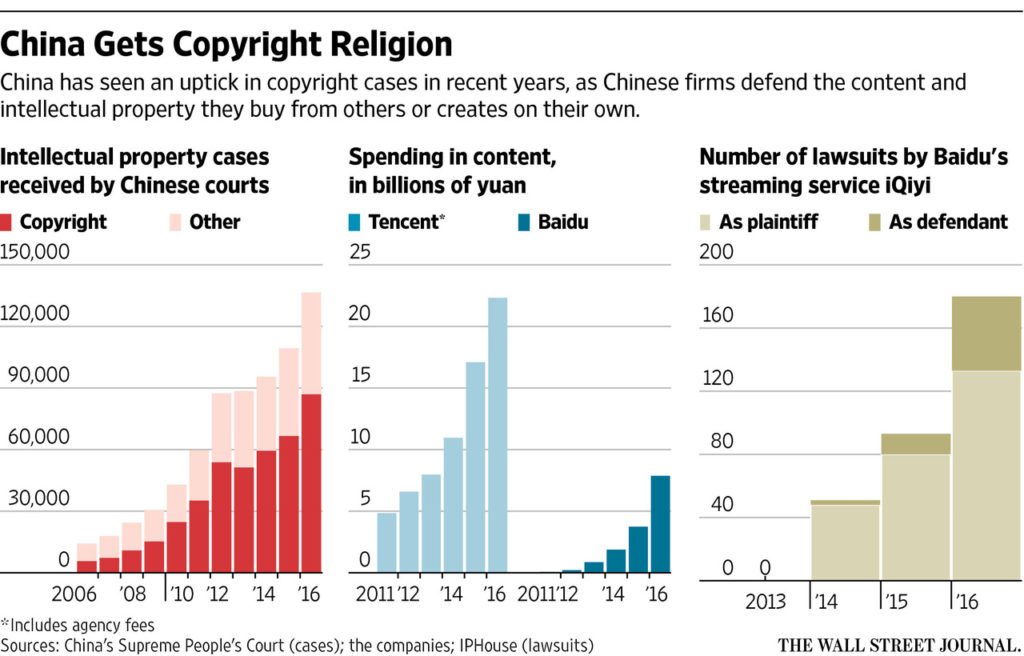Okay, maybe not spectacular. But definitely real.
An article in yesterday’s Wall Street Journal, How a Plague on the Movie and Music Industries Became Their Chief Protector in China sums up the change happening with China IP protection and enforcement:
Chinese search giant Baidu Inc. was once a scourge of Hollywood and the U.S. music industry, which accused it of being a pipeline for pirated content.
Today when Baidu is involved in a copyright infringement case, chances are it is the one casting the blame.
Baidu’s about-face in the copyright fight reflects its emergence as a creator and buyer of content, a transition that continued recently when the company struck a deal to license original shows from Netflix Inc. Other Chinese media companies are undergoing similar transformations, upending how entertainment is protected in the world’s second-largest economy, legal analysts say.
This article quotes Mathew Alderson, our lead China media and entertainment lawyer on how intellectual property protection in China is moving from something that was formerly done to make foreign companies and governments happy, to something China now sees as economically important.
“One of the old rationales for copyright protection…is that it provides an incentive to invest. We are seeing that in play here in China,” said Mathew Alderson, a partner and entertainment lawyer at Harris Sliwoski in Beijing. “Copyright is no longer something imposed on China by the U.S. It is now a tool in Chinese hands.”
The Wall Street Journal notes that in the last ten years China’s courts have seen a 15-fold increase in copyright-related lawsuits:
One way to measure the change is by the escalating flood of lawsuits aimed at protecting intellectual property.
Nearly 87,000 copyright-related cases were filed in China last year, according to data compiled by China’s Supreme People’s Court, a 15-fold increase from 2006. These cases include claims of illegal distribution, or unauthorized reproduction, of written content, video games, movies and TV shows.
And here’s the point that stems from this massive increase in copyright lawsuits in China: the companies that are bringing these lawsuits are spending their time and money because they believe the economic rewards from doing so will be greater than their costs. They have rationally decided that China’s enforcement of its copyright laws warrants this conclusion.
All this is leading to big changes in how Hollywood and Western TV studios are handling their content, with most of them choosing to license their content to Chinese companies (like Baidu and Tencent), rather than work at getting that content into China on their own:
For Hollywood studios, striking deals with Chinese partners is much easier than trying to defend their copyrighted content on their own, said Eric Priest, a University of Oregon School of Law professor who researches copyrights and the Chinese entertainment industry.
“If you’re a content producer with an office in Hollywood, you aren’t going to be familiar with where Chinese netizens are getting unlicensed content,” Mr. Priest said. “You won’t be familiar with the shadowy set-top manufacturers who are installing apps that people buy that allow direct access to unlicensed content. You’re going to be much better off with a partner in China that can do that.”
Just last week, a Beijing court awarded Tencent more than US $1 million in damages in a copyright infringement case. The defendant in the case was Baofeng Technology, a high-profile streaming site and manufacturer of VR hardware. Baofeng has been found liable for copyright infringement numerous times previously (including for unauthorized distribution of films, television, and the most recent World Cup), but that’s surely in part because it’s so visible. After its 2015 IPO on the Shenzhen exchange, Baofeng soared to a valuation of more than US$8 billion, and though its current valuation is closer to US$1 billion, it is a real company, with real assets.
In the case decided last week, Baofeng was found to have streamed the first six episodes of season 3 of The Voice of China without permission from Tencent, which had licensed exclusive streaming rights. The Voice of China is one of the most popular programs in China and it generates significant revenue for the companies involved with it. Tencent wanted to protect its investment.
Tencent’s victory in the litigation regarding The Voice of China is of a piece with other recent lawsuits regarding enforcement of motion picture copyrights in China, including Disney’s victory over a film that ripped off the anthropomorphic vehicles from Cars, decisions holding private cinema operators liable for exhibiting content without permission, and the recent controversy and lawsuit regarding Wolf Warrior 2. Copyright owners in China no longer have to just grin and bear it.
Granted, the legal principles in these cases are straightforward and from what I’ve seen, the fact patterns leave little room for interpretation. When the defendants explain why they weren’t infringing the copyright, they tend to sound like Vanilla Ice explaining why “Ice Ice Baby” wasn’t a blatant copy of “Under Pressure.”
The point is not that Chinese courts are establishing new rights, but that they are enforcing the rights that already exist for copyright owners – and doing so in a meaningful way. Both Chinese and foreign copyright owners are turning to Chinese courts to enforce their rights, and are prevailing. At least with the easy cases.

























